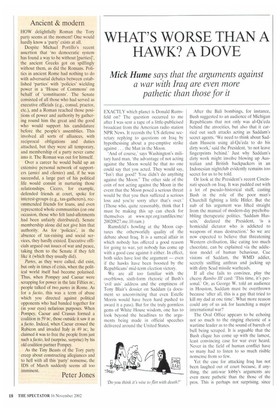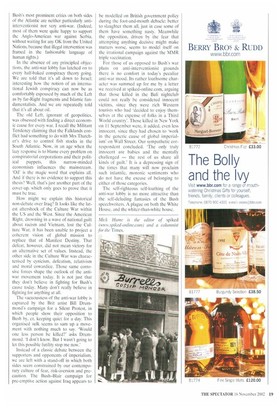WHAT'S WORSE THAN A HAWK? A DOVE
Mick Hume says that the arguments against
a war with Iraq are even more pathetic than those for it
EXACTLY which planet is Donald Rumsfeld on? The question occurred to me after I was sent a tape of a little-publicised broadcast from the American radio station NPR News. It records the US defense secretary replying to questions on Iraq by hypothesising about a pre-emptive strike against. .. the Man in the Moon.
'And of course,' says Washington's military hard man, 'the advantage of not acting against the Moon would be that no one could say that you acted. They would say, "Isn't that good? You didn't do anything against the Moon." The other side of the coin of not acting against the Moon in the event that the Moon posed a serious threat would be that you then suffered a serious loss and you're sorry after that's over.' (Those who, quite reasonably, think that I must be making this up can check for themselves at www.npr.org/ramfilesime/ 20020827.me.10.ram.) Rumsfeld's howling at the Moon captures the otherworldly quality of the debate about Iraq. It is a surreal affair in which nobody has offered a good reason for going to war, yet nobody has come up with a good case against it either. In effect, both sides have lost the argument — even if the hawks have been boosted by the Republicans' mid-term election victory.
We are all too familiar with the overblown, sixth-form rhetoric of Bush's 'evil axis' address and the emptiness of Tony Blair's dossier on Saddam (a document so unconvincing that even Estelle Morris would have been hard pushed to award it a pass). But for the truly gormless gems of White House wisdom, one has to look beyond the headlines to the arguments being made in official speeches delivered around the United States. After the Bali bombings, for instance, Bush suggested to an audience of Michigan Republicans that not only was al-Qa'eda behind the atrocities, but also that it carried out such attacks acting as Saddam's secret agents. 'We need to think about Saddam Hussein using al-Qa'eda to do his dirty work,' said the President, 'to not leave fingerprints behind.' Just why Saddam's dirty work might involve blowing up Australian and British backpackers in an Indonesian nightclub evidently remains too secret for us to be told.
Or look at the President's recent Cincinnati speech on Iraq. It was padded out with a lot of pseudo-historical stuff, casting Bush in the role of the poor man's Churchill fighting a little Hitler, But the nub of his argument was lifted straight from the manual of modern-day psychobabbling therapeutic politics. 'Saddam Hussein,' declared the President, 'is a homicidal dictator who is addicted to weapons of mass destruction.' So we are now expected to believe that threatening Western civilisation, like eating too much chocolate, can be explained via the addiction model of human behaviour. Cue visions of Saddam, the WMD addict, secretly sniffing anthrax and jacking up with dirty Scud missile warheads.
If all else fails to convince, play the cheesy Rambo III card: 'This time, it's personal.' Or, as George W. told an audience in Houston, Saddam must be overthrown because 'after all, this is a guy that tried to kill my dad at one time'. What more reason could any of us ask for launching a major international war?
The Oval Office appears to be echoing not so much to the ringing rhetoric of a wartime leader as to the sound of barrels of bull being scraped. It is arguable that the Bush clique has come up with the lamest, least convincing case for war ever heard. Never in the field of human conflict have so many had to listen to so much risible nonsense from so few.
Yet the case for attacking Iraq has not been laughed out of court because, if anything, the anti-war lobby's arguments are even more pathetic than the those of the pros. This is perhaps not surprising, since Bush's most prominent critics on both sides of the Atlantic are neither particularly antiinterventionist nor very anti-war. (Indeed, most of them were quite happy to support the Anglo-American war against Serbia, without waiting for any OK from the United Nations, because that illegal intervention was framed in the fashionable language of human rights.) In the absence of any principled objections, the anti-war lobby has latched on to every half-baked conspiracy theory going. We are told that it's all down to Israel; interesting how the notion of an international Jewish conspiracy can now be as comfortably espoused by much of the Left as by far-Right fragments and Islamic fundamentalists. And we are repeatedly told that it's all about oil.
The old Left, ignorant of geopolitics, was obsessed with finding a direct economic cause for every war. I recall the Militant Tendency claiming that the Falklands conflict had something to do with Mrs Thatcher's drive to control fish stocks in the South Atlantic. Now, in an age when the lazy response is to blame every problem on conspiratorial corporations and their political puppets, this narrow-minded eeonomism influences the mainstream. 'Oil' is the magic word that explains all. And if there is no evidence to support this thesis? Well, that's just another part of the cover-up, which only goes to prove that it must be true.
How might we explain this historical non-debate over Iraq? It looks like the latest aftershock of the Culture War within the US and the West. Since the American Right. drowning in a wave of national guilt about racism and Vietnam, lost the Culture War, it has been unable to project a coherent vision of global mission to replace that of Manifest Destiny. That defeat, however, did not mean victory for an alternative set of values. Instead, the other side in the Culture War was characterised by cynicism, defeatism, relativism and moral cowardice. Those same corrosive forces shape the outlook of the antiwar movement today. It is not just that they don't believe in fighting for Bush's cause today. Many don't really believe in fighting for anything at all.
The vacuousness of the anti-war lobby is captured by the Brit artist Bill Drummond's campaign for a Silent Protest, in which people show their opposition to Bush by, er, keeping quiet for a day. This organised sulk seems to sum up a movement with nothing much to say. 'Would one less person be killed?' asks Drummond. 'I don't know. But I wasn't going to let this possible futility stop me now.'
Instead of a classic debate between the supporters and opponents of imperialism. we are left with a stand-off in which both sides seem constrained by our contemporary culture of fear, risk-aversion and precaution. The Bush–Blair campaign for pre-emptive action against Iraq appears to be modelled on British government policy during the foot-and-mouth debacle: better to slaughter them all, just in case some of them have something nasty. Meanwhile the opposition, driven by the fear that attempting anything decisive might make matters worse, seems to model itself on the irrational campaign against the MMR triple vaccination.
For those of us opposed to Bush's war plans on anti-interventionist grounds there is no comfort in today's peculiar anti-war mood. Its rather loathsome character was summed up for me by a letter we received at spiked-online.com, arguing that those killed in the Bali nightclub could not really be considered innocent victims, since they were rich Western tourists who had 'decided to enjoy themselves at the expense of folks in a Third World country'. Those killed in New York on 11 September were, it added, even less innocent, since they had chosen to 'work in the generic cause of global imperialism' on Wall Street. Our sympathetic correspondent concluded, 'The only truly innocent are babies and the mentally challenged — the rest of us share all kinds of guilt.' It is a depressing sign of the times that many will now proclaim such infantile, moronic sentiments who do not have the excuse of belonging to either of those categories.
The self-righteous self-loathing of the anti-war lobby is no more attractive than the self-deluding fantasies of the Bush speechwriters. A plague on both the White House, and the whiter-than-white house.
Mick Hume is the editor of spiked (www.spiked-online.com) and a columnist for the Times.



























































































 Previous page
Previous page